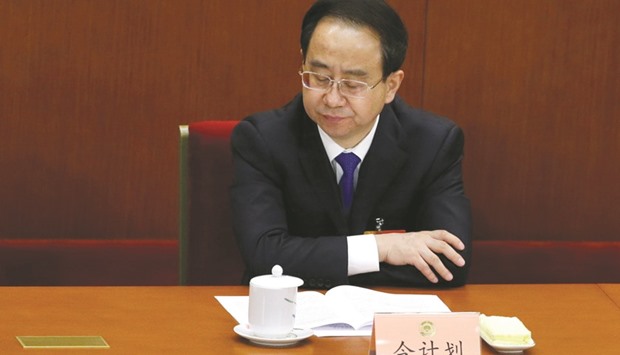Chinese prosecutors have indicted former top presidential aide Ling Jihua on charges of taking bribes, illegally obtaining state secrets and abuse of power, the Supreme People’s Procuratorate said yesterday.
Ling’s proximity to former president Hu Jintao, who was in power from 2003 to 2013, has made him one of the most high-profile targets in President Xi Jinping’s anti-corruption campaign.
Ling was also former deputy head of China’s national political advisory body, the National Committee of the Chinese People’s Political Consultative Conference.
Ling’s son died in a notorious Ferrari crash in Beijing which disrupted a once-in-a-decade party leadership change in 2012.
The 2012 car crash involving Ling’s son scandalised China despite a mainland media blackout – partly because two young women, one nude and one partially clothed, were also injured in the crash, with one reportedly dying months later.
Internet users questioned how the son of a party official could afford a car worth a reported 5mn yuan (around $800,000).
The accusations against Ling are “extremely serious”, the country’s senior prosecutor said on its website, suggesting a lengthy sentence is likely.
He was first put under investigation for “disciplinary” violations in late 2014, the official Xinhua news agency said.
He also committed adultery and had “traded his power for sex”, the government said last year after Ling was formally arrested.
His prosecution is likely to be followed by a tightly choreographed trial, with a guilty verdict and jail term almost guaranteed.
Ling’s case was lodged at a court in the port city of Tianjin, not far from Beijing, meaning he will be tried there.
Yesterday’s reports did not mention Ling’s brother, Ling Wancheng, who is sought by China’s anti-corruption watchdog and is believed to be living in the US.
It is unclear whether Ling Wancheng has sought asylum in the US.
His lawyer denied reports saying that Ling Wancheng is in possession of sensitive information including nuclear secrets and information about Chinese leaders.
US officials have declined to answer questions about Ling Wancheng but a New York Times report said that Washington had rebuffed Chinese requests for Ling’s repatriation.
Another brother, Ling Zhengce, also faces a corruption investigation. Other family members have been detained, state media have said.
Shortly after taking office three years ago, Xi launched his anti-corruption campaign, targeting both junior and senior officials in China’s one-party system.
Dozens of powerful state firms have since come under scrutiny, with many high-ranking functionaries put on trial or brought under investigation.
Graft is endemic in China’s authoritarian system, and Xi has acknowledged it as a threat to the ruling party’s survival.
Ling, 59, is among the highest ranking officials charged in recent years, after Zhou and former Politburo member Bo Xilai who was jailed for life in 2013.
Ling was “clearly” affiliated with the Communist Party’s Youth League, an alternative power-base which has been under attack by Xi and allies in recent months, Steve Tsang, the head of Contemporary Chinese Studies at the University of Nottingham, said.
A delay of more than a year between the party’s probe and prosecution reflects caution on Xi’s part, he said, adding that the president “can’t fight all sides at the same time”.
The announcement comes after months of negative indicators have increased doubt about the party’s economic management.
“This is a good opportunity for Xi Jinping to re-establish his authority as the incorruptible graft-buster,” said Willy Lam of the Chinese University of Hong Kong. “This will promote his stature within the party.”

Ling Jihua: faces a lengthy prison sentence.
